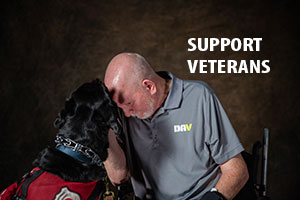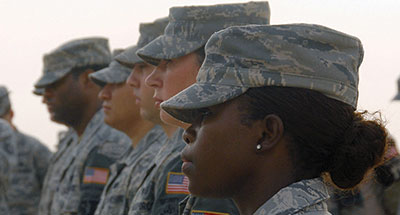What is Traumatic Brain Injury (TBI)?
TBI is a stressful injury to the brain caused by an outward force, often times due to a blow to the head or a violent movement of the head. TBI is not a genetic or degenerative disease. Most TBI cases are caused from vehicle crashes, falls, sports-related injuries, and explosion or impacts from military service. When these injuries occur, the brain is violently moved in the skull causing damage to the brain and bodily functions. Not everyone realizes they have a TBI, even when the symptoms are chronic and impact their daily lives. TBIs can hide in plain sight for veterans because they are largely invisible injuries.
What are the severity levels of TBI?
When it comes to TBI, researchers and care providers class three levels of severity—mild, moderate and severe—based off of loss of consciousness, length of memory loss and responsiveness after the injury. Mild injuries—commonly called concussions—are those that usually result in no persistent symptoms, short- or long-term cognitive or behavioral risks, while the most severe injuries can result in patients remaining in a coma or vegetative state.
What is TBI in the context of war and veterans?
According to the Centers for Disease Control, around 1.7 million people suffer from TBIs annually. Roughly 75 percent of the cases are mild or concussions and approximately 10 percent are severe cases. From 2000-2017, more than 375,000 military members have been diagnosed with TBI—82.4 percent suffered from mild cases, 9.1 percent suffered from moderate cases while 1 percent suffered from severe cases, according to the Department of Defense. TBIs among veterans are generally caused by explosions or combat.
Are Post Traumatic Stress Disorder (PTSD) and TBI the same?
While PTSD and TBI are diagnosable and in some cases share similar symptoms, the two are not the same, though both fall under the same umbrella of injury. PTSD and TBI follow different steps and guidelines to accurately arrive at a diagnosis, but have similar symptoms such as mood swings, anger, depression, anxiety and irritability. According to VA, many people who sustain a TBI will also develop PTSD. This is because in many cases, TBI stems from a stressful or traumatic event, such as a combat related incident, leading many people to a concurrent diagnosis.
How can you tell if you or a loved one suffers from TBI?
TBI requires certain criteria to be medically diagnosed, usually involving CAT scans, MRIs, X-rays and a series of tests. In addition to head injury symptoms such as nausea, dizziness, constant headaches, slurred speech, sensitivity to light and loss of consciousness, additional symptoms may include:
- Seizures – In many moderate and severe cases, seizures occur and are a red flag to more serious brain or neurological injury.
- Difficulty with relationships – Veterans experiencing TBI can find it difficult to connect or find satisfying intimacy in a relationship as a result of persistent negative emotions, memory loss, irritability and aggression.
- Mood swings or personality changes – In some moderate to severe injuries to the head the patient can develop drastic personality changes along with mood swings due to constant irritability from the pain and stress of the injury.
- Depression – Many times those who suffer from TBI develop depression or impulsivity control issues as they feel like they are no longer the same person they once were before the head injury that caused the TBI.
- Motor impairment – As seen in many severe cases, motor impairment is a major symptom. Most patients diagnosed with a severe cases of TBI are in a coma, vegetative state, or partially immobilized causing them to lose basic motor skills.
How to cope with TBI?
As compared to PTSD and MST mild and moderate cases of TBI are manageable and can be controlled so that you can live a normal life. Severe cases of TBI are more complicated to cope with, but there are ways to still live a fulfilling life and ways to manage symptoms. After seeking profession medical help to begin rehabilitation some ways to cope with TBI are show below.
Don’t push yourself too hard – After leaving the medical rehabilitation center, the best way to cope with TBI once back home is to ease into your normal life and routine once again and to not overstress or overdo anything too quickly. According to VA, “most patients who took this advice were back to normal at work or school in three to four weeks. Most patients who weren’t told what to do took five to 12 weeks to get back to their normal routine.”
Have a daily routine – To take some stress and pressure out start and stick with a daily routine that will ease the brain and yourself back into your previous life.
Don’t let the symptoms control you – Many times people diagnosed with TBI focus so much on the symptoms that they let it control how they dictate their lives. According to VA, “doctors who treat TBI agree that the single most important factor in recovery is that you know what to expect and what to do about the symptoms. You should remember that the symptoms are a normal part of getting better. They will likely go away on their own.”
Seek support from family and friends – A critical part of recovery and coping with TBI is having a support network. TBI can change the layout, roles and responsibilities of a family, but having support from a group that is adaptive and resilient helps improves recoverability and the patient’s quality of life.
What Resources are available for a veteran struggling with Traumatic Brain Injury?
Veterans with service-connected TBIs can get assistance at no cost in filing their claims for VA benefits. Contact your local DAV National Service Office for more information.
Other resources abound:
http://www.northeastern.edu/nutraumaticbraininjury/what-is-tbi/severity-of-tbi/
http://www.mayoclinic.org/diseases-conditions/traumatic-brain-injury/basics/treatment/con-20029302
https://www.nichd.nih.gov/health/topics/tbi/conditioninfo/Pages/symptoms.aspx










